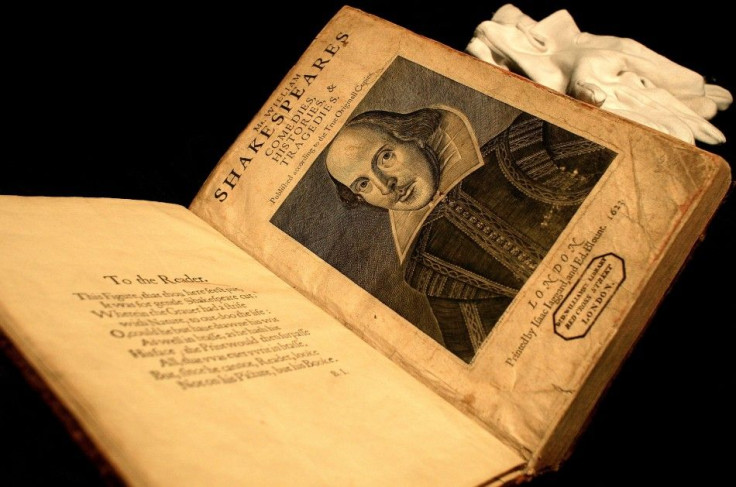Shakespeare's 3.5 million-pound First Folio Copy Found in A Small French Library

A rare and valuable copy of William Shakespeare's First Folio was discovered in a French provincial town library. There are just 230 of these books in the world, but one copy had lain untouched in the library at Saint-Omer, north of France, for about 400 years.
Most probably, the copy had been brought by English refugees of Anglican persecution. Medieval literature expert, Rémy Cordonnier, was looking for something that could be used in an exhibition of "Anglo-Saxon" authors, when in September, he came across the book that had been written in 1623. The librarian did not realize that he held a treasure, he said. It had lain hidden among hundreds of other books in St-Omer, near Calais, for some 400 years, and was worth up to 3.5 million pounds or $5.5 million, according to Daily Mail.
Having been wrongly spotted as a work from the 18th century, he said on Tuesday that initially, it did not seem valuable. Having been used a lot and damaged, the collection of 36 plays seemed to be in a good state but had 30 pages missing, including the title page, according to The Guardian.
Till his death in 1616, Shakespeare got very little attention. It was only seven years later that two of his best friends, John Heminge and Henry Condell, collected all his works in a book called the First Folio. It was a record of comedies, histories and tragedies that at first had gone for only one pound! The editors had written on it that it was designed, "only to keep the memory of so worthy a friend and fellow alive, as was our Shakespeare."
Cordonnier immediately contacted an authority on Shakespeare, Prof Eric Rasmussen of the University of Nevada in Reno, who was in London working at the British Library. Dr Rasmussen had written a book on the First Folio called "The Shakespeare Thefts," about the global search for whatever was available of the first 750 copies of the book. It had been much coveted by thieves across the centuries.
Originally, this edition had 300 pages, but now has 30 pages missing and no title page. Still, it would be the centrepiece of the French library's exhibition next summer. Interestingly, the Henry IV script looks as if someone has written notes and directions on the pages that seem to be dated to the time when the book was produced.
In the 16th century, Saint-Omer was home to an important Jesuit order welcoming Roman Catholic clergy escaping Protestant persecution in England. The First Folio was brought to France at the time and held in the Jesuit library until the French Revolution. At that time, Jesuit order's collection was taken away and used for a public library.
Without this edition, many of his original plays, including "Julius Caesar," "As You Like It," "Twelfth Night" or "Macbeth" may never have been available to the world, as about 18 of his plays were not published until he died in 1616, according to The Telegraph.
In the forthcoming exhibition, about 50,000 books and manuscripts from the 7th to the 19th century will be on display. About 48 copies or partial copies of the 15th century Gutenberg Bible, which is among the world's most valuable books are existing. The First Folio will not be on general display, but will be scanned, so that it can be consulted on the library website, from which other libraries and museums can borrow it.





















